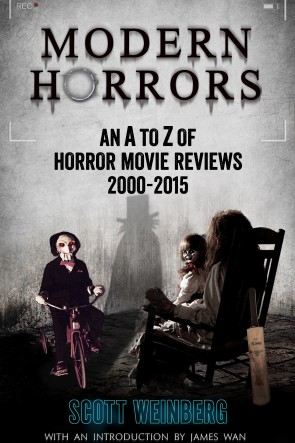Review: DAYLIGHT (2013){0}
Clever indie filmmakers just keep coming up with new (and generally legitimate) excuses to position their horror tale as “found footage.” In most cases their film’s premise involves a documentary film crew, which helpfully explains all the extra lighting and the “keep filming no matter what” attitude that keeps the action moving forward, but lately there have been new developments in where the “footage” is “found,” which means there’s a few small splashes of novelty to be found in some otherwise half-decent horror flicks.
That brings us to this periodically choppy and slightly overlong American horror movie that feels more like three distinct segments than a cohesive whole – but that’s not to say there’s not some cool ideas and novel twists to be found. Daylight is most assuredly a glass-half-full indie chiller, despite a handful of occasionally evident shortcomings, because it’s actually got a novel idea, a handful of legitimately creepy moments, and (once is all said and done) an admirable sense of Twilight Zone-style madness that still manages to alleviate the rough spots.
Our story is a simple video archive in which three family services officers from Daylight, Indiana delve into what seems like a relatively straightforward case of child abuse — but interviews with alleged victims, suspects, students, and parents start to tell a bigger story: that perhaps a local priest is doing monumentally awful things. Cover-ups, conspiracies, and odd behavior start cropping up, and then… well, to say much more would rob the filmmakers of their surprises. Suffice to say that first-timers David McCracken, Joel Townsend, and Kaidan Tremain use a creepy old fact-based story before launching into their own style of thrills, chills, and overt weirdness.
The idea that a local priest in a small town could be a secretly malevolent force is, of course, nothing new, but Daylight is more interested in the idea of suggestion; that perhaps parents, teachers, and well-intentioned social workers could indirectly plant false memories into the mind of a child — and how that could end just as bad as actual abuse. If the filmmakers spend a bit too much time on our ostensible heroine (Jennifer Bacon) and her two assistants, then they make up for it with a finale that’s weird, surprising, and actually sort of creepy.
Daylight is sort of a weird entry into the “found footage” canon, in that it’s much more of a procedural than a chase story or a trek deep into the forest. The filmmakers earn points for finding an interesting entry point for their tale of religion-based fear and paranoia, and while I certainly wouldn’t spoil anything, the movie offers a second-act switch that’s both enjoyably jarring and impressively effective. Daylight still feels about 15 minutes longer than it needs to be, but what works here works pretty darn well.
★★★★
Scott Weinberg








